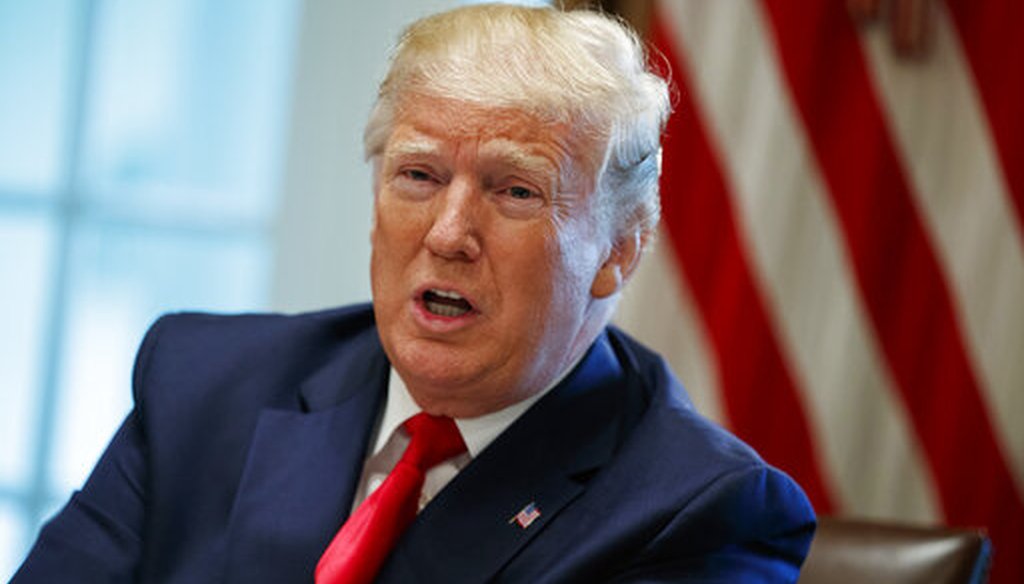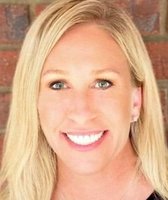Get PolitiFact in your inbox.

President Donald Trump speaks during a meeting at the White House on June 13, 2019. (AP/Vucci)
Pundits on both sides reacted to President Donald Trump’s declaration during an interview with ABC’s George Stephanopoulos that he would accept dirt on his 2020 opponent from a foreign power and might not tell the FBI that he’s done so.
But while many have condemned the remarks, some conservative commentators defended Trump by saying Hillary Clinton did the same thing.
"We know definitively that a presidential candidate did do it because Hillary Clinton did, and her campaign and the DNC paid for a foreigner's information on her opponent," said CNN guest Rob Astorino during a June 12 panel on "Cuomo Prime Time."
Astorino was referring to the Steele dossier, a collection of memos produced by former British spy Christopher Steele that made claims about Trump’s ties to Russia and was partially paid for by the Clinton campaign.
Other conservative commentators raised similar points.
"Hillary Clinton literally empowered a foreign agent who produced a dossier full of Russian lies that was used to infiltrate our electoral process," said Fox News host Sean Hannity.
"Hillary Clinton took information from a foreign government," added Mollie Hemingway, an editor at The Federalist and a contributor on Fox News. "The Democratic National Committee secretly paid for this dossier that by their own accounting was sourced to government officials in Russia."
Do these pundits have a point? We wondered how Clinton’s funding of the Steele dossier compares to the scenario Stephanopoulos asked Trump about, so we asked some experts.
Put simply, the two are not the same.
Trump’s controversial statement came after Stephanopoulos asked if he would alert the FBI in the event that a foreign government like Russia offered dirt on an election opponent, or if he would take the information.
"I think maybe you do both," Trump said. "I think you might want to listen. There’s nothing wrong with listening."
"It’s not an interference," he added. "They have information. I think I’d take it."
EXCLUSIVE: Pres. Trump tells @GStephanopoulos he wouldn't necessarily alert the FBI if approached by foreign figures with information on his 2020 opponent: "It’s not an interference. They have information. I think I’d take it." https://t.co/bewhYcvoSa pic.twitter.com/o5rsz75TSd
— ABC News (@ABC) June 13, 2019
Trump’s comments put him at odds with FBI Director Christopher Wray, who said in testimony before Congress that the FBI would like to know if a public official or campaign were contacted by a foreign government about influencing an election.
The remarks are also significant given the Trump campaign’s role in the infamous Trump Tower meeting, during which Donald Trump Jr. met with a Russian government lawyer after being told she had derogatory information on Hillary Clinton to give the campaign.
Steele, a former British intelligence agent, created the Steele dossier on behalf of Fusion GPS, a U.S.-based opposition research firm that was hired to work for the Clinton campaign.
But the firm’s research into Trump was already underway when the Clinton campaign got involved. It was originally hired by the Washington Free Beacon, a conservative website.
It was only after Trump secured the Republican nomination that Fusion GPS was hired on behalf of the Clinton campaign and the Democratic National Committee by their law firm, Perkins Coie, to continue compiling research about Trump.
At that point, the firm hired Steele, who had sources in Russia. Steele produced 35 pages of research memos, which became collectively known as the Steele dossier and detailed some salacious — but not fully verified — claims about Trump.
Experts we spoke to described a range of differences between the type of information Trump said he would accept and what Clinton’s campaign was paying Fusion GPS for.
The main difference is the role of a foreign government.
"Working hand-in-hand with a foreign power for information intended to influence an election is different than hiring a private firm that then hired somebody who had been a former intelligence agent," said Karen Greenberg, director of the Center on National Security at Fordham Law.
"Everybody does opposition research," she added. "The issue here is the foreign government."
That distinction is critical, experts told us, because a foreign government that interferes in American politics is likely to have a stake in what happens on Election Day.
While Russia’s meddling was intended to help Trump win, Steele was contracted by Fusion GPS to find out more about Trump’s ties to Russia. "That has nothing to do with a candidate soliciting something from a foreign power," former CIA intelligence agent Glenn Carle said.
"One is collecting intelligence and the other is an active measure by a foreign power to achieve a political end of some sort," Carle said. "There’s no comparison at all."
A foreign government could also take measures that Steele, a private British citizen, would not have been capable of, said Max Bergmann, senior fellow at the left-leaning Center for American Progress and an expert on U.S.-Russia policy. Russia, for example, used its intelligence apparatus to hack the Clinton campaign and steal damaging information.
"Steele is not a member of the U.K. government, so it’s not like they (the Clinton campaign) were working with a foreign government that was trying to interfere in our election," Bergmann said. "They’re not in the same ballpark."
Our Sources
ABC News on Twitter, June 13, 2019
CNN, Transcript for "Cuomo Prime Time," June 12, 2019
RealClearPolitics, "Mollie Hemingway: If Getting Info From A Foreign Government Is A Problem, Ask Democrats About Steele Dossier," June 12, 2019
America’s Newsroom on Twitter, June 13, 2019
Business Insider, "Trump's allies have a dubious new talking point about the Steele dossier and the Russia meeting," July 17, 2017
The New York Times, "The Trump Dossier: What We Know and Who Paid for It," October 25, 2017
PolitiFact, "Trump and Russia, Clinton and Ukraine: How do they compare?" July 12, 2017
PolitiFact, "The FBI, the Steele dossier and wiretapping, explained," September 11, 2018
PolitiFact, "Taking a closer look at the ‘Steele dossier’ and Carter Page’s warrant," January 5, 2018
PolitiFact, "Donald Trump falsely says new Carter Page documents show Steele dossier launched Russia probe," July 23, 2018
Email and phone interviews with Chris Preble, vice president for defense and foreign policy studies at the Cato Institute, June 13, 2019
Phone interview with Karen Greenberg, director of the Center on National Security at Fordham Law, June 13, 2019
Phone interview with Max Bergmann, senior fellow at the Center for American Progress and director of the Moscow Project, June 13, 2019
Phone interview with Larry Korb, senior fellow at the Center for American Progress and a senior adviser to the Center for Defense Information, June 13, 2019
Phone interview with Glenn Carle, former CIA intelligence officer and author of "The Interrogator: An Education," June 13, 2019
























